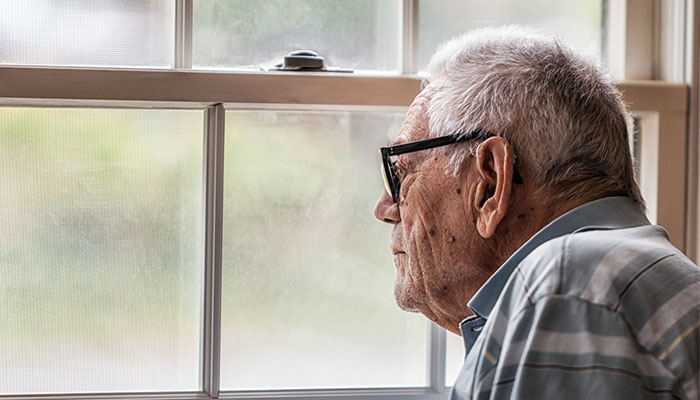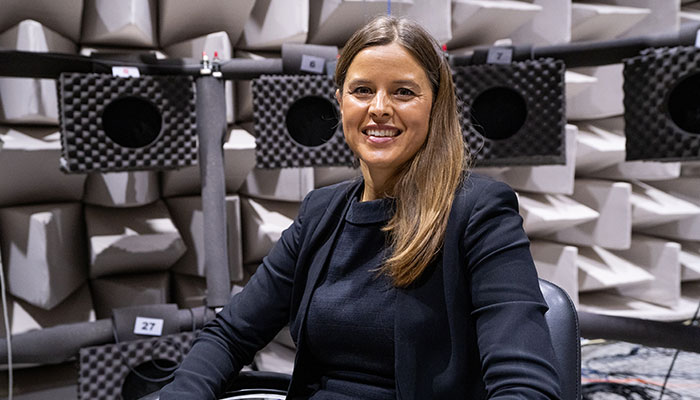Globally, one in three adults aged over 60 has hearing loss, increasing to four in five for those over 80. Over the life course, hearing declines through exposure to loud noise, secondary consequences of cardiovascular changes, or general ‘wear-and-tear’.

Isolation: Hearing loss has a substantial impact on mental wellbeing.
While hearing loss in older adults is often dismissed as a normal consequence of ageing and garners little attention from health professionals, policy-makers or even those who have hearing loss, it has major consequences for ageing well.
That is, hearing loss in older age not only affects communication, but has a substantial impact on mental wellbeing. As more and more people are living to older ages, it is critical that these extra years of life are healthy, happy and productive.
Hearing loss is often accepted as a normal part of ageing. But hearing loss may lead to greater dependence, restricted social participation and loneliness, leading to an increased likelihood of depression.
Helen Keller said that ‘vision loss cuts you off from things, but hearing loss cuts you off from people’.
Researchers at Macquarie University conducted seminal research to understand the impact of hearing impairment on mental wellbeing, and the benefits of addressing hearing loss to improve mental wellbeing.
In the 2009 Australian Blue Mountains Hearing study of 1328 Australians aged over 60, those with hearing loss were 64 per cent more likely to report symptoms of depression than those with good hearing.
In a follow-up study [also co-authored by Dr McMahon], people who had hearing loss were more likely to feel that their hearing problems impacted their personal/social life, and people who reported hearing handicap were 80 per cent more likely to report depressive symptoms over five years of follow-up.
Recent studies from the SENSE-cog project in Europe [co-lead by Dr Dawes] indicated that even mild levels of hearing loss were associated with an increased chance of having a diagnosis of major depression, and having both hearing loss and vision loss increased chances of anxiety and depression over six years of follow-up.

Action: Audiology Professor Cath McMahon says promoting hearing rehabilitation will improve wellbeing for older Australians.
Vision and hearing loss were even associated with an increased likelihood of thinking about suicide over five years of follow-up.
Hearing loss results in significant limitations in daily life, increasing social isolation and reduced ability to engage in pleasurable past times.
Hearing programs can improve wellbeing
The good news is that there is an opportunity to improve wellbeing in older age by addressing hearing loss through hearing rehabilitation programs, which often include fitting hearing devices such as hearing aids.
Research has shown hearing aids are effective in reducing the impact of hearing loss on communication. The Blue Mountains Hearing study reported that people who used hearing aids were 32 per cent less likely to report symptoms of depression, also shown in two experimental trials.
A Dutch study in 2012 also linked hearing aid use to a 30 per cent reduction in depression in people living in aged care facilities.
Raising awareness of the importance of hearing health by putting in place effective hearing loss prevention programs and ensuring access to hearing healthcare form key elements of the Australian Roadmap for Hearing Health, endorsed at the Council of Australian Governments in March 2019.
- Dementia Centre offers hope in fight against second biggest killer disease
- Cannabis as pain-killer: Fact versus fiction
These factors are also integral to the World Health Assembly Resolution on the Prevention of hearing loss and deafness – unanimously passed in 2017 – and the World Health Organisation’s World Report on Hearing which will be launched next year.
Professor McMahon continues to be involved in these major national and global initiatives that seek to transform the way in which we view and respond to hearing loss in older adults.
Identifying adult-onset hearing loss early and providing the right supports – including technological, psychological, and social supports – can reduce the negative consequences that hearing loss can have on mental and physical health, and our connection with others and the environment.
In this way, we can ensure that older adults live healthy, happy and productive lives.
Professor Cath McMahon is Macquarie’s Head of Audiology and Director of the H:EAR research centre. Dr Piers Dawes is an Associate Professor in Audiology in Macquarie’s Department of Linguistics.



